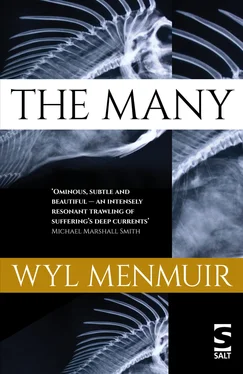Wyl Menmuir - The Many
Здесь есть возможность читать онлайн «Wyl Menmuir - The Many» весь текст электронной книги совершенно бесплатно (целиком полную версию без сокращений). В некоторых случаях можно слушать аудио, скачать через торрент в формате fb2 и присутствует краткое содержание. Год выпуска: 2016, Издательство: Salt, Жанр: Современная проза, на английском языке. Описание произведения, (предисловие) а так же отзывы посетителей доступны на портале библиотеки ЛибКат.
- Название:The Many
- Автор:
- Издательство:Salt
- Жанр:
- Год:2016
- ISBN:нет данных
- Рейтинг книги:4 / 5. Голосов: 1
-
Избранное:Добавить в избранное
- Отзывы:
-
Ваша оценка:
- 80
- 1
- 2
- 3
- 4
- 5
The Many: краткое содержание, описание и аннотация
Предлагаем к чтению аннотацию, описание, краткое содержание или предисловие (зависит от того, что написал сам автор книги «The Many»). Если вы не нашли необходимую информацию о книге — напишите в комментариях, мы постараемся отыскать её.
The Many — читать онлайн бесплатно полную книгу (весь текст) целиком
Ниже представлен текст книги, разбитый по страницам. Система сохранения места последней прочитанной страницы, позволяет с удобством читать онлайн бесплатно книгу «The Many», без необходимости каждый раз заново искать на чём Вы остановились. Поставьте закладку, и сможете в любой момент перейти на страницу, на которой закончили чтение.
Интервал:
Закладка:
He looks around at the front room and it occurs to him again that the house is as unfamiliar to him now as it was when he arrived, as strange and unforgiving as it has been to him all along. And he is certain, when he leaves, this space will change again. It will change again beyond his recognition, and if he was to return to the house at some point in his future, he knows it would not be the same place in which he stands now. The coals in the grate are glowing their last and he uses an iron poker to move them around and help them on their way, and he feels beneath his thin socks the frayed carpet where the fire must have spat out hot embers. He does and does not want to leave this place. But Lauren is not coming. He has been talking to her at a distance for weeks, but it is only now he registers what she has been saying to him. That she is waiting for him at the home they share.
As the last of the embers fade to black, he has a brief waking dream that the sea has pulled itself in again, up the hill towards Perran’s house. Or that Perran’s house is somehow pulling itself forward towards the sea, compressing the space between the two, willing itself towards the water. That this place is the site of a battle long fought between the sea and the land and the inhabitants of this place. The sensation is so strong that he gets up and goes to the window and stares out into the bright cold daylight to see if he can perceive any difference in either the village or the sea, but everything looks calm now, as it was when he first arrived. And though the white flecks on the waves in the distance may be a fury of confusion closer up, from up here, and now, the sea looks benign.
He tries to put the thought to one side, and when it will not shift he walks upstairs and retrieves the canvas bag from the bed. He leaves the house by the kitchen door and this time closes it behind him before going to the car.
He throws the bag in through the car door onto the passenger seat and stands leaning against the thin doorframe. His old estate has already started to become part of the landscape, and for a moment he has the strong sensation that the rotting car is the only sign he will leave that he has been in this place.
He gets in and connects the leads beneath the dashboard to start the engine. It coughs into life. He taps the control panel again, but there is no response. The fuel gauge still reads empty. He tests the one working wiper to clear some of the rain from the windscreen, but that too is now not working.
Timothy drives slowly down through the village, and as he passes by, he sees few of the villagers in the streets, and the ones he sees have a look of panic, as though they fear some inevitable change that is about to occur. As he passes the tightly packed cottages, he can see in through open doors, people shifting furniture. Whether they are preparing for another high tide or for something else he does not know, and cannot ask. Though he can see nothing in the village that has changed, the small streets feel narrower, the houses less substantial somehow, and the journey between Perran’s and the beach road feels compressed, shortened. As he drives, almost at walking pace, he looks behind himself several times, though there is no one following him and no one paying attention to his movements.
As he gets closer to the beach, he sees several people he recognises from the mob the week before, but they are all too concerned with their own business to register him. The stares on those he passes are blank and without recognition. The sense of watchfulness he has had over the past few weeks and months has faded, as though everyone is going about their jobs now, as though he is no longer their concern.
He does not stop at the beach and does not look to see whether Clem has resumed his post on the step of the winch house, but instead fixes his gaze onto the road that lifts up from that point, along the coast and away from the village.
It is as the road starts to rise that the engine starts to struggle. There is no power in it and he knows, even before the road becomes steeper, the car is never going to make it to the top of the rise. It is over quickly. The engine does not put up much of a fight, just coughs a couple of times and then it cuts out completely. After a moment the car starts to roll back down towards the village and he pulls on the handbrake, which slows it down, and then he jams the wheel over to one side, so the car comes to a rest against the verge.
He gets out and takes the canvas bag from the passenger seat before carefully closing the car doors, and he walks up the steep hill away from the village. At the top he sees the woman in grey again, standing some way off beside her car, and it occurs to him that maybe she is standing guard over them. He wonders whether she has left her post out on the coast road since the waters rose. Even from a distance, he sees, despite the intensity of her gaze, that she looks tired and worn. She must stay somewhere to sleep or at least to rest, he thinks, though he cannot picture her staying in the village. Usually she is either standing or leaning against the bonnet, staring in towards the village centre, or out towards the boats as they leave the cove and when they return to the shore.
Timothy walks on towards her, out of the lee of the hill and he feels the wind howl in from the sea. It is strong and he lowers his gaze and puts a hand up in front of his face, and walks on towards her. As he gets closer he realises he has lost sight of the woman and he assumes she has got into the car and is now sitting behind the tinted glass windows. When he walks round in front of the car, though, he sees she is not there and he walks further, around the bonnet, and finds her kneeling down on the tarmac beside the car. She is praying perhaps, or crying. As he gets closer still he sees she is doing neither, but instead is tracing patterns on the surface of the road with the tip of her forefinger, lines which run in several directions, which intersect and run across each other. She does not turn towards him then or raise her head as he approaches, though he feels she is aware of him approaching.
When he is within a few feet of her he stops and observes her at her task, and when she does not acknowledge him, he turns around and looks out to sea while he waits for her to finish whatever it is she is doing.
24. Timothy
THE FINE RAIN driving in from the sea has passed now, as though it was never there, but it has soaked through his thin jacket and Timothy looks to either side of him. To one side the village and to the other the road cutting a line between the empty sea and the empty fields. He stands between the two for some time before he realises the woman in grey has joined him and now she stands next to him, looking out from the verge beside the parked car.
The hood of her long coat is pulled up over her hair against the wind, but she is turned slightly towards him and Timothy can see her face clearly. While she must see him, she does not acknowledge him. She is watching something intently and he follows her gaze.
At first he thinks she is looking towards the horizon, where he sees the container ships have broken free of the great weight that had held them where they were, and they are now barely visible on the horizon and spread much further than they had been, almost invisible now in the distance.
But he feels his gaze being drawn back towards the shore and he sees that what she is watching is a boat in the middle distance, small in the mounting sea. Though the Great Hope is a way out, pitching on the unsettled water, Timothy sees the boat as if it is in close-up. He can feel it shift beneath his feet and beneath his fingers he feels the peeling paint and the crack in the window at the side of the wheelhouse and the nets laid out neatly on the crates, and he knows, though is unsure how this could be, that she is showing this to him somehow, that she is guiding his vision.
Читать дальшеИнтервал:
Закладка:
Похожие книги на «The Many»
Представляем Вашему вниманию похожие книги на «The Many» списком для выбора. Мы отобрали схожую по названию и смыслу литературу в надежде предоставить читателям больше вариантов отыскать новые, интересные, ещё непрочитанные произведения.
Обсуждение, отзывы о книге «The Many» и просто собственные мнения читателей. Оставьте ваши комментарии, напишите, что Вы думаете о произведении, его смысле или главных героях. Укажите что конкретно понравилось, а что нет, и почему Вы так считаете.











